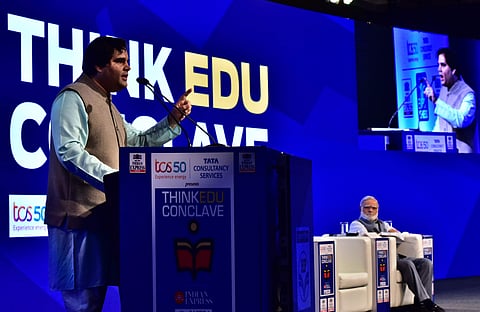

The only way India can end corruption is by using an open data platform to track every expense incurred and make it public, said Feroze Varun Gandhi, Member of Parliament and BJP leader, speaking at TNIE's ThinkEdu Conclave. Gandhi, who confessed that he "spent a lot of time on the field outside and much less inside parliament," recommended removing opacity by using a system that will enable accountability for every rupee of public money spent, he said.
Pointing out that corruption has made its way deep into the bureaucracy, he said that it worried him how the majority of retired officials and bureaucrats now go on to directly work for private companies - some of which had been favoured heavily by the Department they had been working with. Making observations from data he obtained through the Right To Information Act, he said, "I found something very strange going on in the bureaucracy. I found that over 20 per cent of people in the last 10 years above and in the rank of a Joint Secretary have taken voluntary retirement. I have no problem with it. But a large number of them have gone and worked directly for a private concern which affects, guide and navigates the same field they were working at and serving the government," he said.
He pointed to a specific example, in which the head a large nationalised bank, went on to work for a company that had massive loans outstanding with the same bank, a week after he retired. "The head of a large nationalised bank, went to work, a week after he retired, as a consultant to a company that owed Rs 7,000 crores to the same bank at which he worked for ten years. I don't know... maybe it is a coincidence," he said rather surreptitiously.
However, with further expansion in transparency, and the involvement of youngsters in politics, there is an expanding role for citizens in politics, he said adding that true democracy will prevail if citizens act as a powerful collective.
Linking this to how corruption had also grown among politicians, he said that in 1952 only one per cent of the population wanted to be professional politicians while in 2014 it had risen to 24 per cent. Looking at the money power that people in politics welded today, he rued, "In the last Lok Sabha elections, 79 per cent of the time the richest candidates won the election and a hundred per cent of the time, the poorest candidates lost it."
He said that as a result of this, several important discussions that actually matter to the people are kept out of the parliament. Drawing on personal experience, he said that at one point, he desperately wanted to talk about pollution at the assembly, when his arguments were shut down as "irrelevant" by the speaker. "Immediately after the election, I want to deal with two problems: hunger and climate change," he affirmed.
Shooting straight from the hip, he said that at a point in time, he even wanted to diverge from the party's ideology to support certain issues. "When Dr Tharoor spoke about legalising same-sex marriage, I wanted to vote with him on it," he said adding that his party whip asked him to not do it.
Pointing to how very little debate and transparency remained in how Parliament was debating the issues of the land, he said that in the last 20 years, 64 per cent of the laws were passed in parliament without discussion and 68 per cent was passed without referring it to any standing committee.
